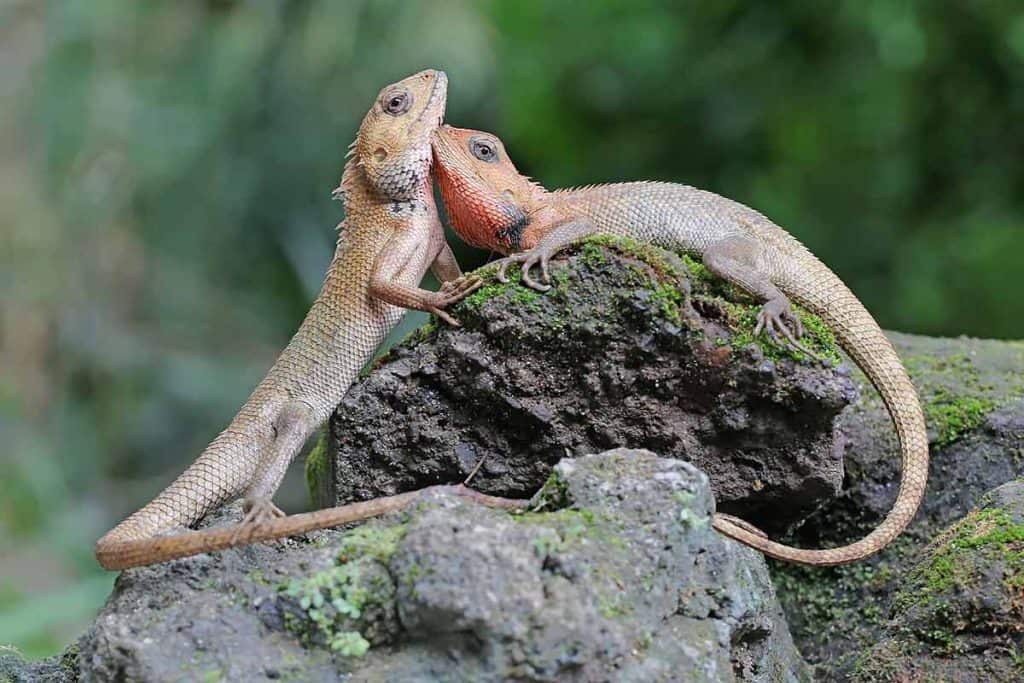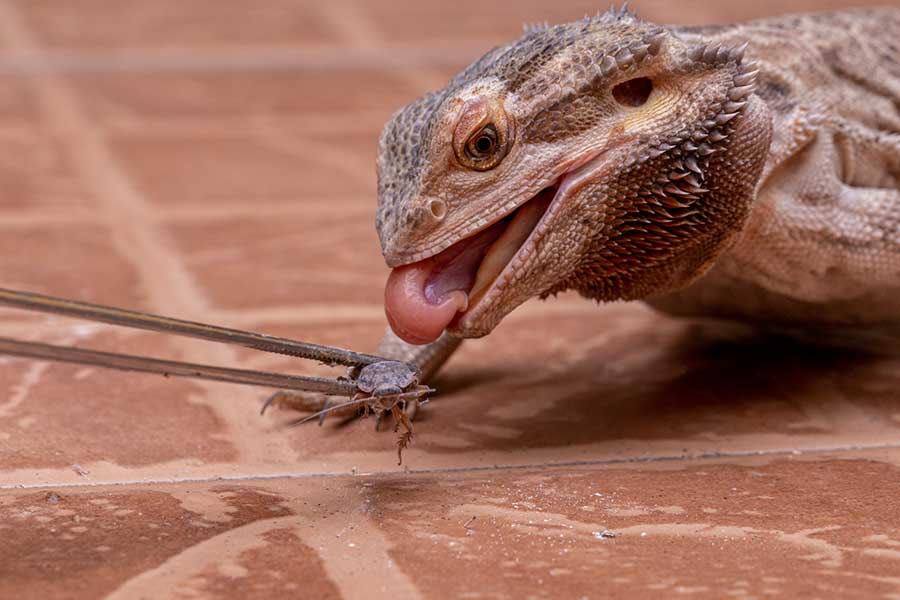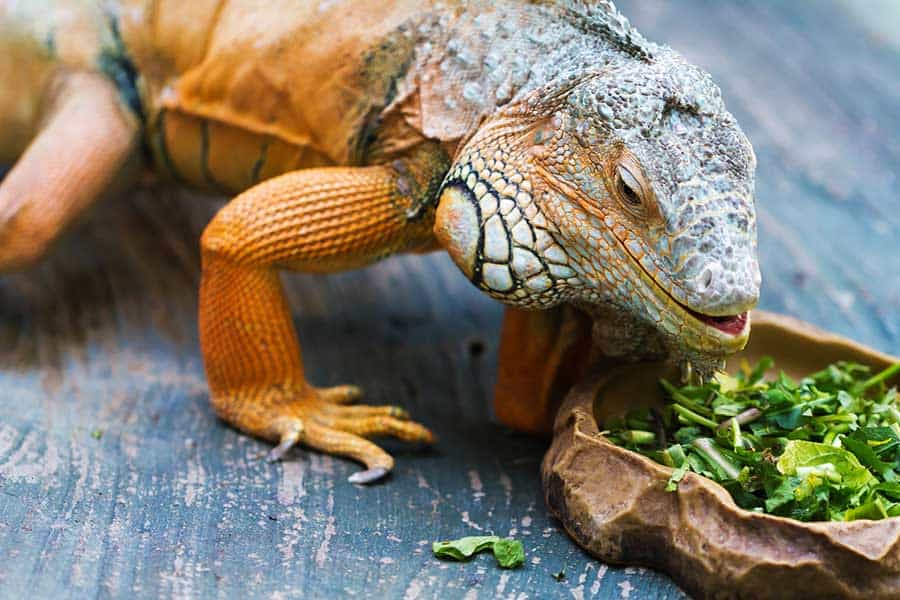In the US, there are many unique kinds of garden lizards. Just like how some people take care of the birds in their gardens, you can feed and look out for the lizards, too!
Garden or backyard lizards are an essential part of the ecosystem, but you may be wondering: what do garden lizards eat?
Most garden lizards are insectivores, which means they only eat insects. However, there are some lizards that may frequent your backyard that may be omnivorous, which means they will eat both insects and plant matter.
Read on to find out how you can feed the lizards in your backyard safely and foster a healthy ecosystem!

What Do Garden Lizards Eat?
The Insectivores
There are many lizards that are strict insectivores, like leopard geckos, which means they cannot eat anything other than insects because their digestive systems are not designed to process vegetation or plant matter.
Insectivores need variety in their diet, which means you need to offer them different kinds of insects so they get diverse nutrition as well as enrichment. These staple insects should be the bulk of their diet.
Staple feeder insects can be fed live by placing them in a container that prevents them from jumping out but is shallow enough for lizards to get into. You can also place the insects on a plate and keep an eye on them so they do not run away before the lizards get to them.
Safe and healthy insects to feed your garden lizards include:
- Crickets
- Dubia roaches
- Phoenix worms (also known as NutriGrubs and black soldier fly larvae)
- Hornworms
- Blue and green bottle flies
- Mealworms
- Superworms
- Grasshoppers
- Mantids
There are other insects you can feed the lizards in your garden that are delicious but not as nutritionally beneficial. You should not feed them to your backyard lizards more than three times a week, but they make great occasional treats. Some great examples of “treat” insects that most garden lizards love include:
- Waxworms
- Butterworms
- Silkworms
It is important to vary your garden lizards’ diets because they need many different kinds of vitamins and minerals that come from different insects.
The Omnivores and Herbivores
Some lizards are omnivores, like bearded dragons, which means they eat insects as well as vegetation. A few other lizards are strict herbivores, such as the green iguana, which may be a garden lizard if you live in Florida. Herbivorous lizards only eat plant matter.

Read through the list below to learn what greens and vegetables are safe for your garden lizards to eat:
- Dandelion greens
- Mustard greens
- Pak choi (also known as bok choy)
- Alfalfa hay
- Collard greens
- Dark lettuces
- Pumpkin
- Sweet potato
- Parsnips
- Bell pepper
- Carrot
- Broccoli
- Yellow and orange squash
- Zucchini
Always make sure that all seeds and pips are removed.
Can Garden Lizards Eat Fruits?
Fruits should be used as treat items because they are very high in sugars. Both herbivorous and omnivorous lizards enjoy eating fruit. Offer pieces of fruit three times a week at most.
Safe fruits that most lizards love include:
- Blackberries
- Blueberries
- Raspberries
- Strawberries
- Mango (very popular)
- Sweet melon
- Figs
- Pears
- Apples
- Grapes
- Bananas (with or without skin)
Can Garden Lizards Eat Flowers?
Flowers add some interesting flavor variety to your garden lizard’s meals. There are some easily accessible flowers that are safe for all kinds of herbivorous and omnivorous garden lizards to eat.
- Hibiscus
- Dandelion
- Rose petals
- Chrysanthemum
- Nasturtium
- Dahlia petals
- Lavender
- Snapdragon
- Zucchini flowers
Do Backyard Lizards Need Supplements?
It is not essential to add supplements to your backyard lizard’s food. However, if you want to go the extra mile and make sure they are very healthy, then you can sprinkle a
These supplements help lizards develop strong muscles and bones as well as facilitate proper digestion.
What Not to Feed Your Garden Lizard
While garden lizards do not have a strict diet and they can eat a wide variety of insects and plant matter, there are still things that can kill them very easily and painfully if ingested. Always make sure the food you are giving them is safe for them to eat. Many foods that are safe for humans and other animals can actually be toxic to reptiles like common garden lizards.

Here are the key foods that will cause serious harm to your garden lizards and kill them.
Toxic Insects
Any bioluminescent insects, including lightning bugs and fireflies, should be avoided. The bioluminescence is incredibly toxic to reptiles and will kill them.
Caterpillars and butterflies are also very toxic to reptiles and should be avoided. This is because many of the species carry toxins and poisons within their skin that are meant to be deterrents to predators.
Ticks should also be avoided, as they carry parasites and bloodborne pathogens that are deadly to reptiles.
Grains
Bread, rice, and other grains are very problematic for reptiles. Their digestive systems are not equipped to handle these types of foods, and they can suffer from blockages (impaction) and death.
Toxic Vegetables
Some vegetables are very toxic to reptiles and can cause serious health problems up to and including a painful death. Vegetables to avoid at all costs include:
- Avocados
- Rhubarb
- Eggplant
- Garlic
- Spicy peppers
- Onions
Iceberg lettuce and other light and very watery leaves, celery, and cucumber should also be avoided not because they are toxic but because they carry little to no nutrients and are instead filled with water. This means they are not beneficial to reptiles and can easily cause diarrhea.
Toxic Fruits
Citrus fruits including oranges, mandarins, and pineapple are very acidic and can burn the digestive tract of reptiles.
Additionally, any fruit with seeds, pips, or stones must have them removed before they are given to reptiles. The seeds, pips, and stones will cause blockages (impaction) and can quickly lead to a very painful death.
Human Foods
Processed human foods contain preservatives and colorants that are toxic to reptiles.
Chocolate and coffee, for example, must be avoided at all costs because they contain theobromine which is toxic to reptiles. They are powerful stimulants that will overload a reptile’s nervous and cardiac system and kill them.
Unfortunately, some people use coffee combined with tobacco formed into balls as a ‘deterrent’ to garden lizards not realizing that it is a deterrent because the coffee is killing the lizards in a very painful way.
FAQs on Feeding Backyard Lizards
How big should the food be that I put out in the garden?
As a general rule for feeding lizards, the food should not be larger than the space between their eyes. This is a bit difficult to judge if you are feeding the lizards in your yard. As a rule of thumb, cut the pieces of food so they are no larger than your thumb nail.
Where should I put the food for the lizards in my garden?
Wild lizards that live in your garden are very aware of predators and will not eat the food that you put out for them if they feel like they will be attacked.
Common predators are birds, cats, and dogs. Using a bird feeder is risky because they are designed specifically for birds.
Make sure your pets, especially dogs and cats, do not have access to where you eventually put the food.
Find a place in your garden that is shaded, possibly under some trees or brush so that it is protected from birds. Place your tray of food for them there.
Should I give my garden lizards water?
All reptiles need fresh water. When you place your tray of food out for them, put a shallow water dish out for them, too. The dish should be shallow so that small lizards do not drown. It must also be heavy enough so that it is not easily tipped over.
Change the water every couple of days so that it is fresh.
Some lizards do not recognize standing water as water and will not drink. They only drink from water droplets. You can place a small dripping container in a safe place in your garden. The droplets should land on leaves or run down the wall so the lizards in your garden can drink from them.
How do I know what type of food to put out for my garden lizards?
Identifying garden lizards can be tricky, so you might not know if they are insectivores, herbivores, or omnivores. Additionally, many common garden lizards are very skittish and will flee if you try to get close enough to identify them. Therefore, you should put out a variety of food and see what has been left at the end of the day.
If they eat all the insects and the vegetables are left untouched, then the lizards in your garden are probably insectivores, and you do not need to worry about putting out vegetables and wasting them. The same goes vice versa if the vegetables are eaten and the insects are left.
A Final Word on Garden Lizards
There are over 118 species of lizards in the USA. They all have different care requirements and belong to different climate regions. Many of them are facing environmental pressures which put them at risk.
Taking the opportunity to care for the lizards in your garden and those you keep as pets and learning what they eat is a step in the right direction to doing your bit for the conservation of our scaly friends.

